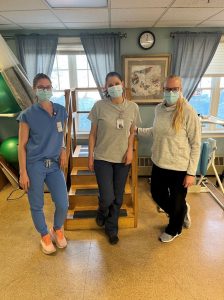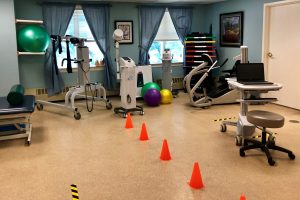Athena’s Outpatient Care: Helping Parkinson’s Disease Patients at Newtown Rehab
NEWTOWN, C.T. — Parkinson’s disease does not have to limit a person’s life. That’s what the team in the therapy department at Newtown Rehabilitation & Health Care Center in Newtown, Connecticut would like their patients and their loved ones to understand. For years, the Newtown therapy department has been improving the quality of life for people diagnosed with Parkinson’s Disease.
Parkinson’s Disease is a brain disorder that impacts the brain’s ability to connect movement to the muscles. It can often lead to instability, lack of coordination, shaking, and stiffness. Staying mobile and active can help reduce and improve the symptoms associated with Parkinson’s Disease and that’s what the Newtown rehab team does and will continue to do.

Olivia Duffy, Kimberly Stewart, and Stephanie Hurley
Stephanie Hurley, a Physical Therapist, and Occupational Therapists Kimberly Stewart, Olivia Duffy, and Lauren Storandt are passionate about treating patients with Parkinson’s. They hope to inspire their patients to continue to move in an effort for them to live as successfully as possible with the debilitating disease.
“What we work on is big movements to get them to be able to do their general gross motor activities and tasks like walking, climbing stairs, getting in and out of bed,” Hurley, who is the Director of Rehabilitation Services at the Newtown center, said. “The more that we practice, the better the patients are. We’ve seen when you do consistent therapy two to five times a week, every week you’ll see an improvement in these patients. You can tell when they’ve had a week off because they come back and they’ve had a decline.”
Hurley has been a Physical Therapist for 10 years. She’s been at the Newtown center for seven years. Her team of therapists each come with experience of their own to lead patients in recovery. Duffy has been an Occupational Therapist for five years, Storandt for nine years, and Stewart for 24 years.
The four say the treatment of the disease varies based on each person’s case, disease progression, as well as the type of treatment being conducted. They encourage the family to be involved in the therapy sessions to show ways to continue therapy and movement outside the center. By teaching loved ones the techniques to work at home, it can help maintain independence for the person with Parkinson’s. The therapists can also offer tips on how to adapt to the home environment and modify how things are done to maximize that independence.
There is one patient they have been seeing for two and a half years. When she first started, she had difficulty standing and walking. She was in an adaptive wheelchair because she was uncomfortable sitting upright. Today, she is able to sit upright in a wheelchair, can engage in activities and go out with family, and can even walk up to 200 feet.
“We’ve been able to build up her strength and endurance of not just her muscles but also her internal organs, her heart muscles and everything else to allow her to be able to stand, to allow her body to understand that she is able to stand without collapsing,” Hurley said.
It’s successes like those the team wants others with the disease to have. Storandt added it’s not just the physical part they work on in therapy but also cognitive aspects.
“Along with the physical regression that occurs as the disease progresses, there’s also cognitive deficits that progress,” said Storandt. “Not only do we focus on the physical components that are being affected by the disease, but we also take into account and work with the individual and their caregiver on those cognitive deficits that can progress over time as well.”
The therapists recommend using items such as calendars and cooking timers to help with memory around the house. Stewart likes to use music in her treatments to help with coordination and movement.
It can be difficult to motivate people with Parkinson’s Disease to want to put in the work. Duffy said there are ways that help encourage patients such as doing a group exercise, working outside on a nice day, or doing an activity they enjoy where they may not realize it has therapeutic benefits.
One thing the team said is very comforting to the patients is the environment at Newtown. Hurley notes those in the outpatient rehab center are mainly geriatric clients, which helps make it a desired location for this population. Being around similar people can help the patient find peace and comfort in their recovery journey. The outpatient center is proud to offer one-on-one therapy sessions with a consistent therapist to promote continuity of care.
“I like how they, over a period of time when you’re treating them, you start to see the carryover especially if the family is involved. Seeing that it’s a team of people that are helping this individual be able to tie their shoes or eat their meal without spilling because of a tremor,” Duffy said.

A section of the Newtown Rehabilitation Clinic
Storandt enjoys working with Parkinson’s patients because she likes the people and their families, and hearing about their life. There’s also a sense of collaboration and education for “both the patient and caregivers about the diagnosis.”
For Hurley, her love of treating Parkinson’s comes from the motivation the outpatient folks bring to the center. They come to get better, she said, and they come empowered. While medication can also help manage symptoms, Hurley likes to work with patients when on and off the medication to prevent further decline. The team of therapists bring positive, upbeat, and motivating personalities. The patients feel that energy and thrive off of it, which makes the therapy sessions enjoyable for the patient and not feel like a typical session.
“What we try to do is improve the patient to their highest capacity and then once they reach their highest capacity of function, we try to keep them at a maintenance level,” she said. “It’s its own reward of seeing how well they’re doing knowing we’re helping them.”
New patients for the Outpatient Rehab Center at Newtown Rehab will be fully assessed, looking at posture, balance, strength, coordination, flexibility, and so much more to put together the best therapy plan to help slow the progression of Parkinson’s Disease and continue to give them the independence they deserve.
You can also find the therapy team at the Newtown Senior Center where they conduct a monthly Parkinson’s exercise group for the town residents.
Interested in starting services for your loved one or learning more about the full range of services offered at the Outpatient Rehab Center at Newtown, please call 203-364-3225.
Athena Health Care Systems has four outpatient therapy offices in Connecticut including Beacon Brook Health Center in Naugatuck, Cherry Brook Health Care Center in Canton, Montowese Health & Rehabilitation Center in North Haven, and Newtown Rehabilitation & Health Care Center in Newtown as well as Active Physical Therapy & Wellness in Wilbraham, Massachusetts.
Follow Athena Health Care Systems on Twitter and Facebook & Newtown Rehabilitation & Health Care Center on Facebook. Interested in a career with Athena? Click here!

